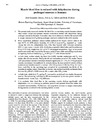Identificador persistente para citar o vincular este elemento:
https://accedacris.ulpgc.es/jspui/handle/10553/6568
| Título: | Muscle blood flow is reduced with dehydration during prolonged exercise in humans | Autores/as: | González-Alonso, J. Calbet, JAL Nielsen, Bodil |
Clasificación UNESCO: | 241106 Fisiología del ejercicio | Palabras clave: | Heat Blood flow Dehydration Exercise |
Fecha de publicación: | 1998 | Publicación seriada: | Journal of Physiology | Resumen: | 1. The present study examined whether the blood flow to exercising muscles becomes reduced when cardiac output and systemic vascular conductance decline with dehydration during prolonged exercise in the heat. A secondary aim was to determine whether the upward drift in oxygen consumption (VO2) during prolonged exercise is confined to the active muscles. 2. Seven euhydrated, endurance-trained cyclists performed two bicycle exercise trials in the heat (35 C; 40-50 % relative humidity; 61 +/- 2 % of maximal VO2), separated by 1 week. During the first trial (dehydration trial, DE), they bicycled until volitional exhaustion (135 +/- 4 min, mean +/- s.e.m.), while developing progressive dehydration and hyperthermia (3.9 +/- 0.3 % body weight loss; 39.7 +/- 0.2 C oesophageal temperature, Toes). In the second trial (control trial), they bicycled for the same period of time while maintaining euhydration by ingesting fluids and stabilizing Toes at 38.2 +/- 0.1 C after 30 min exercise. 3. In both trials, cardiac output, leg blood flow (LBF), vascular conductance and VO2 were similar after 20 min exercise. During the 20 min-exhaustion period of DE, cardiac output, LBF and systemic vascular conductance declined significantly (8-14 %; P < 0.05) yet muscle vascular conductance was unaltered. In contrast, during the same period of control, all these cardiovascular variables tended to increase. After 135 +/- 4 min of DE, the 2.0 +/- 0.6 l min-1 lower blood flow to the exercising legs accounted for approximately two-thirds of the reduction in cardiac output. Blood flow to the skin also declined markedly as forearm blood flow was 39 +/- 8 % (P < 0.05) lower in DE vs. control after 135 +/- 4 min. 4. In both trials, whole body VO2 and leg VO2 increased in parallel and were similar throughout exercise. The reduced leg blood flow in DE was accompanied by an even greater increase in femoral arterial-venous O2 (a-vO2) difference. 5. It is concluded that blood flow to the exercising muscles declines significantly with dehydration, due to a lowering in perfusion pressure and systemic blood flow rather than increased vasoconstriction. Furthermore, the progressive increase in oxygen consumption during exercise is confined to the exercising skeletal muscles. | URI: | https://accedacris.ulpgc.es/handle/10553/6568 | ISSN: | 0022-3751 | DOI: | 10.1111/j.1469-7793.1998.895ba.x | Fuente: | Journal Of Physiology [ISSN 0022-3751],v. 513 (3), p. 895-905 |
| Colección: | Artículos |
Vista completa
Citas SCOPUSTM
243
actualizado el 08-jun-2025
Citas de WEB OF SCIENCETM
Citations
224
actualizado el 01-mar-2026
Visitas
346
actualizado el 16-ene-2026
Descargas
293
actualizado el 16-ene-2026
Google ScholarTM
Verifica
Altmetric
Comparte
Exporta metadatos
Este elemento está sujeto a una licencia Licencia Creative Commons

